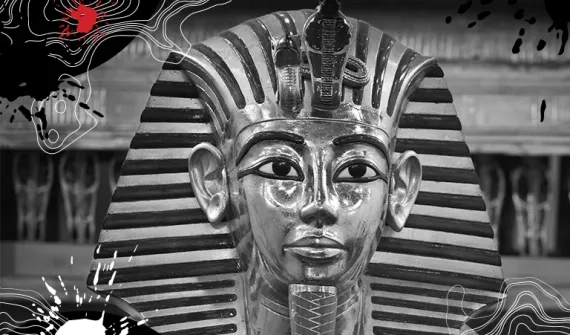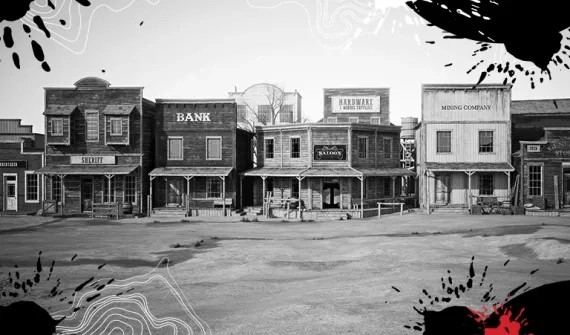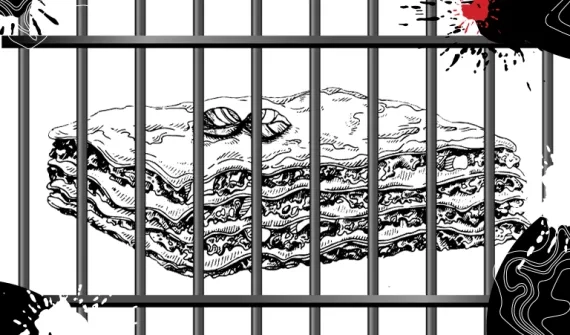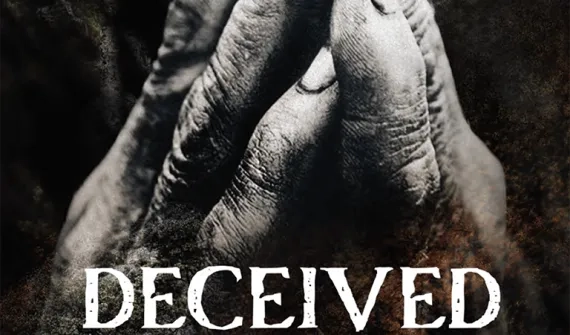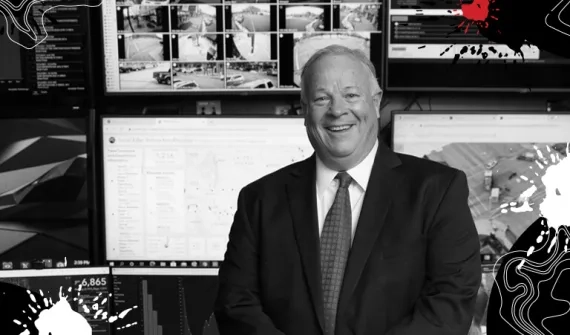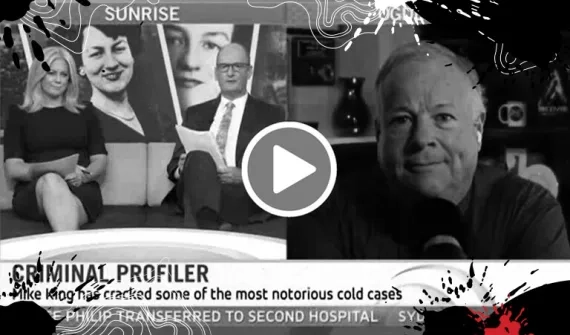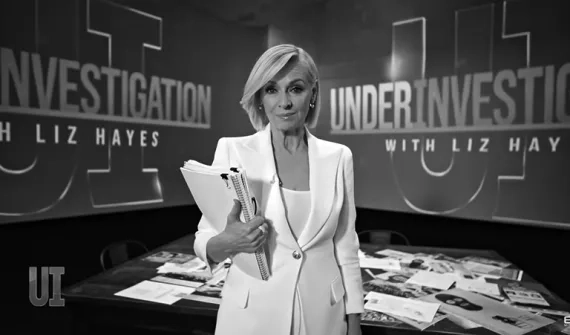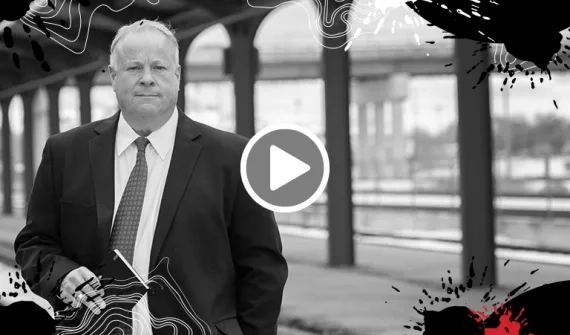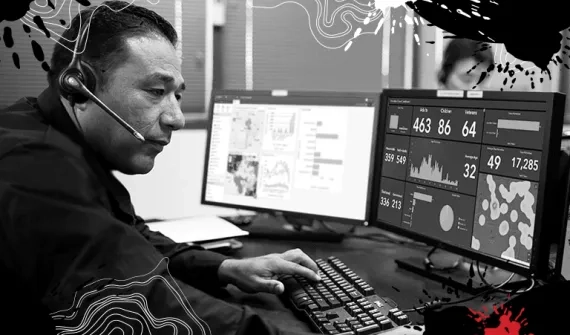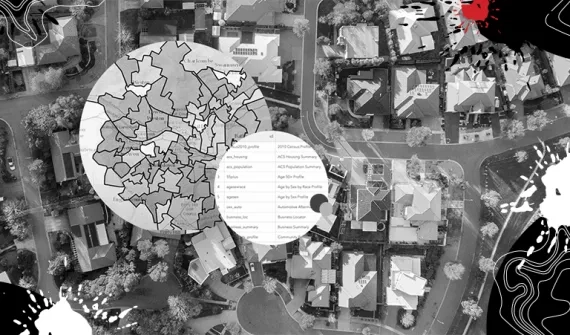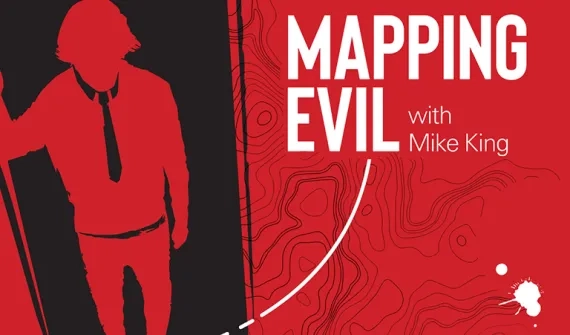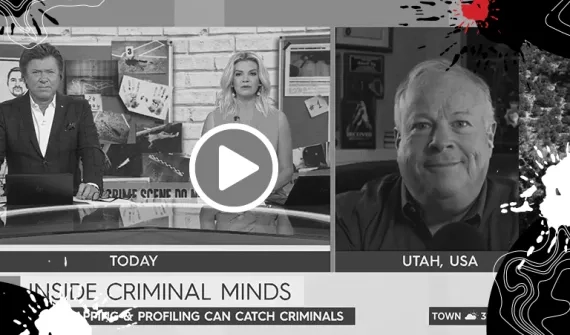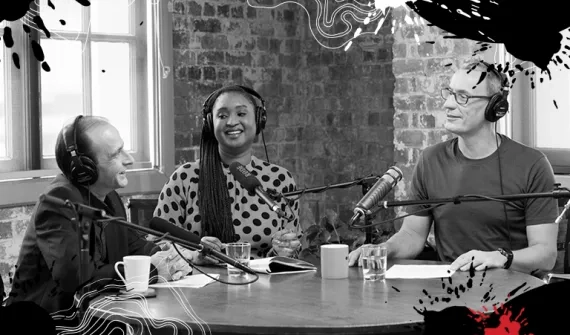The man behind the map
In this special bonus episode of Mapping Evil with Mike King, award-winning journalist Tory Shepherd takes a closer look at the man behind the map. With a little encouragement from Tory, Mike delves deep into his past, sharing intimate details of the stories that have shaped his life and career.
From a near fatal accident during the earliest days of his time on the force, to his encounters with a sitting president and some of America’s most malevolent serial killers – Mike reveals the twists and turns of a career that reads more like a Hollywood script than a resume. His walk down memory lane takes Mike back over the most defining cold cases of his career, venturing deep into the heart of America’s ‘Wild Wild West’ and all the way back to the time of Tutankhamen.
Join Tory as she shares some of the more candid moments captured with Mike throughout Season One of Mapping Evil.
And we should not make any mistakes about this. These people that kill people – it's hard to kill someone, and yet they will continue to do it. And when they fail or fall short or the victim lives, they have to return back to their confines and work out in their mind that fantasy, figure out what they did wrong and solve it the next time.
Mike's most memorable moments
Discover more about crime mapping
Never miss an episode of Mapping Evil – subscribe now.
About the hosts

If you have information about any unsolved crime or suspicious activity, then you can share what you know with Crime Stoppers, without saying who you are or getting involved. Call 1800 333 000 – or go to crimestoppers.com.au.
Get the latest from BGT Productions
- Click to view the Meet Mr King transcript
Mapping Evil Bonus Ep bounce
Tory Shepherd: I'm Tory Shepherd, and this is Mapping Evil with Mike King. The podcast that investigates the geography of crime.
Support for this episode comes from the country's leading mapping technology and services provider, Esri Australia. To learn more about how Esri tech is making a difference in crime analysis and public safety, head to esriaustralia.com.au
Mike King [voiceover]: When a bolt of lightning hit a large high tension, powerline above me and came down and landed on the top of my shoulders.
She was shot and killed while my grandfather was playing a fiddle in 1891.
The death of Tutankhamun… we were able to solve that homicide 3,400 years later.
I looked down and saw a man putting a rifle under a blanket on the back seat of his vehicle and of course the presidential motorcade was coming.
Pretty soon fantasy isn't adequate enough and they finally have to act it out.
What I found in my career is that treating them with dignity has led to getting confessions a little more easy.
Tory Shepherd: In this Mapping Evil special, you meet the man behind the map.
If you're a regular listener to this show, you'll know that Mike and I cover some pretty heavy topics. To help us both find our way back to a much happier place at the end of each podcast, Mike is often up for a quick chat about something I unearthed in my research about him.
By nature, I'm a pretty curious person. It goes with the territory of being a journalist. As I –and I'm sure you – have come to learn, Mike does enjoy a good chat.
In this special bonus episode it's my absolute pleasure to share with you some insights into the man behind the map – Mr. Mike King. There is certainly a lot more to him than meets the eye.
I think the best place to start when it comes to Mike and his career is at the beginning.
In this first piece, you'll hear me catch Mike a little off-guard about a time early in his career that very few people are aware of.
Story one: Lightning strikes.
Mike, tell me what happened with the live wire.
Mike King: I'd been a policeman only a few months when that happened. We have a thing called a field training officer program and I was off in field training on my own. One of the first nights that I worked alone, I was in the middle of a huge electrical storm. I received a call on the radio saying, “you need to go and check a house that's on fire”.
The electricity is out and the fire department can't open the doors on the fire station because all of the electricity is out. I responded to the scene and it was pitch black other than the bolts of lightning that were streaking across the sky. It was just a terrible, almost Halloween-like night and it was raining.
As I walked in and was peering across an open field at this home that was on fire – I had left my patrol car with the door open my overhead lights on. I had walked the short distance to peek into the field when a bolt of lightning hit a large high-tension powerline above me. It snapped the power line – which was 47,000 volts – and it came down and landed on the top of my shoulders and gave me the ride of a lifetime.
Tory Shepherd: Oh, Mike that is more horrifying than I even thought! I once threw a leg over a bull fence and gave myself a real shock. You just painted such a mental image. I'm sorry I had to take you back there.
Mike King: It actually was a pretty amazing experience when it first hit me. For some reason, I was able to stay conscious through the entire episode. I was trapped in this live wire for 20 minutes while they were trying to get that shut off at the substation.
Tory Shepherd: Twenty minutes, Mike! Holy Moley!
Mike King: Yeah, it was amazing. The amazing thing that happened is when it first hit me, it was so powerful that it held me off the ground about three feet and I was curled up into a fetal position because of just the intense muscle contraction that occurred. The reason I know about that was actually an 18-year-old boy coming home from a date actually had pulled over and saw the bolt of lightning hit the power line and of course the line falling on me.
So for a matter of seconds I was suspended in air from the power of this electrical line and I fell to the ground. It’s amazing how your mind kind of works Tory because I had a flashback immediately of when I was a child.
Do you remember as a child putting the sprayer on the end of the garden hose and having it just enough that it flipped around like a wild snake and you would run and try to avoid the water? Well, that's what the power line was doing when I hit the ground, it was flipping back and forth like a hose.
I had this flashback of being with my buddies on the front lawn of our home trying to avoid the water hitting me – but it was actually electricity, and it came and connected onto my leg just below my groin.
Then I had my second wild experience and memory for the next 17 or 18 minutes. The wire was on my leg and the sparks were going down my leg and off my feet. They were maybe going about four or five meters into the air off of my feet. I had this flashback – and only the older listeners will understand this – but there used to be a television black-and-white program called Flash Gordon, and Flash would always fly around with his jet pack and the sparks would come off the bottom of his jet pack.
I remember thinking to myself ‘holy cow, I look like Flash Gordon right now’. Then I found myself getting weaker and weaker and had what was for me a very spiritual experience that I don't talk about.
After about 20 minutes, they were able to shut the power off. There was a huge explosion which actually blew me about four meters away from where I was hit and I was able to crawl away.
I remember the paramedics picked me up and took me to the hospital. I was in the hospital and a man from the local power company walked in and wanted to know where the deceased was, so that he could get my name – and I could hear him. I screamed out “I'm not dead yet!”. He walked in and actually brought in my flashlight.
Maybe I can send a picture we can put it on the website – but the flashlight that I was holding was about two feet long and it was a big metal flashlight. You could see where my hand was wrapped around the flashlight because I couldn't let go of it because of the electricity. You can see where all of the batteries inside of the flashlight and the flashlight itself melted except for where my fingers were.
So he brought my flashlight and a big piece of dirt where I was laying – and the dirt where I was laying had turned to glass it was so hot. So that's my experience.
I have never wanted to have anything to do with electricity since then. It took over a year to heal from that, but it was an experience that gave me some time to reflect on what's important in life.
Tory Shepherd: Mike, that is the most extraordinary story. I was not expecting that. I'm sorry that we took you back there but I'm very happy that you're here now.
Mike King: I am as well. I figured at that point that the heavens didn't want me – so I'm going to just hang around and do my stuff here.
Tory Shepherd: As you heard, Mike alludes to taking a year to recover from the accident.
He took a year to recover but he didn't exactly put his feet up. He actually went pretty much straight back to work, even though he couldn't feel his legs. He explained it was pretty much like having pins and needles all the time. He's made of pretty tough stock, this man – which brings me to our next little snippet.
One of the things I've learned about Mike is that when it comes to his family, it's one of his favourite topics. Here I asked him about a time when his work-life crossed paths with his family life.
Story two: Mike's great-great-grandmother's murder.
I heard a story Mike, about a cold case that you solved that was close to home might even have been a relative.
Mike King: Holy cow. It's interesting. Yes, it was 130 years ago that my great-great-grandmother was shot and killed at a Western town celebration in the Four Corners area of the United States.
Tory Shepherd: Mike, was it a Western town like I'm thinking – with a bar with like saloon doors? Are we talking Wild West?
Mike King: You know, this is the Wild Wild West, and this is one of the most amazing women. I can't wait to meet someday in the hereafter because, she came across the ocean and walked across the American planes – barefoot no less – when she was seven years old. Then she was raised in Utah and ended up travelling down to the Four Corners area as part of a group of people who conquered the Grand Canyon.
At the front end of the Grand Canyon, they lowered 83 wagons and 2,000 head of cattle 2,000 feet down these sheer cliffs. They worked their way into the Four Corners area and settled that area. The thing that became so intriguing is on her 43rd birthday she was shot and killed while my grandfather was playing a fiddle.
Everyone was at the town dance celebrating statehood for the state of Utah. It was a crazy, crazy time in 1891. It took 130 years to solve her case but I kept thinking there's got to be something out there that we could find to help solve this mystery. After 10 years of investigations, I found that golden nugget that put it all together.
Tory Shepherd: Well, Mike so many questions remaining? How can people read the full story?
Mike King: There's a book – actually a rewrite it's called Jane – A Woman's Determination and the Wild West Frontier. It's going to have a new name in a couple of months so by the time this hits the airwaves in Australia, we'll have a new book out and they can order that on Amazon and read the entire story – which is an absolutely captivating story. It is so gripping when you find out what happened.
Tory Shepherd: Just like all our regular episodes, we'll be sure to link any of the resources and books Mike mentions available to you at mappingevil.com.au.
Now Mike's great-great-grandmother's murder is not the oldest cold case his solved – if you can believe that. There is a case Mike and a buddy of his solved that would have to go down as the absolute oldest – possibly the coldest – in history. Here I am putting Mike on the spot about one of the greatest mysteries of all time.
Story three: The murder of King Tut.
Mike.
Mike King: Yes ma'am.
Tory Shepherd: I was reading about how you solved the murder of King Tut.
Mike King: That is correct. Now a lot of investigators take a lot of pride in how cold the cold case is that they solved – and the death and murder of Tutankhamun in 1340 BC is the oldest, coldest case. With the help of my dear friend, Greg Cooper, we were able to solve that homicide some 3,400 years later.
Tory Shepherd: Well, ‘who dunnit’?
Mike King: You have got to buy the book and read who killed King Tut. The secret about that investigation was that we were invited by the Discovery Channel to go and look into the death of Tutankhamun – we had to go in and almost vicariously go everywhere that the Pharaoh travelled.
It was really an exciting opportunity. We spent months in Egypt where we travelled multiple trips back and forth. We went everywhere that the Pharaoh would have travelled. We moved from kingdom to kingdom trying to understand what was happening politically and financially in the country. For those that are history buffs, there were incredible religious battles going on between those who believed in monotheism and those who believed in polytheism multiple gods.
Those factors started to rise to the surface as motivation for the killers to get rid of the young Pharaoh. Now think about this – this was a very young Pharaoh when he came to power. He was really a puppet in the hands of the Vizier – or the leader or Chief of Staff – for the country at the time.
We saw this progression as he starts to come into power and starts to weaken the structure around him – and several suspects rose to the surface. One of those was the army general. It was a powerful general by the name of Horemheb. On many cases we see when governments are overthrown, it’s by the generals and the armies.
We had to look really closely at him. There was this Vizier – a man named Ay – who was second-in-command to the Pharaoh. We had to look at the power structure there. We had to look at the Egyptian boogeyman out there – the guy who might just sneak in and kill the Pharaoh for some particular reason. Or that he might've been injured out in an accident like racing his chariot – like kids do today in their hopped-up supercharged vehicles. At 18 years old, this young Pharaoh might have been racing his chariot across the desert and hit a rock and was killed.
What we were able to do is take behavioural analysis and all of that information in totality, and come up with a theory that the young Pharaoh was actually murdered and the book outlines how we put that together. This is kind of a fun part of the book – we put together a ‘charge’ against the person that we believed was responsible for the case and held a ‘grand jury’ and then later convicted them of murder.
Tory Shepherd: Mike, I love how in true crime style you've given us some red herrings, some false leads and then another great big tease. I love it! Did you use any GIS? As you were travelling around between all those different areas, how did you map where he was compared to where you were going?
Mike King: Yeah, in fact we used GIS every step of the way – and that was what was really fun from my personal perspective, being a GIS lover. We had to look at things like the movement of the Nile river and how it rises and falls during rainy season and during the driest parts of the year. Those were significant times when they would actually bring supplies up the Nile or ferry big chunks of rock to build the temples and other kinds of things.
We had to take into account the movement and the human movement of people. We had to look at the physical structure of these environments – like where those who were called to be royalty would live. And those who were the support staff, and the servants and the workers around them.
When we started looking in Giza and the creation of those magnificent pyramids – or even the 4,500 year old Saqqara pyramid – we had to take into account how geography was used to move rock from one place in the country to another place and the way in which they would do that. Then just how they move from the upper to the lower kingdom in the course of natural running of the business of government.
All of that became really important – and then introduce all the wackiness with the Nubians attacking them and all of the people that were constantly fighting with the Egyptian empire and how they strategised in war. That was all information we could place out on the map as we looked at the overall theories behind who might have killed King Tut.
Tory Shepherd: Mike, what's the name of the book again?
Mike King: Who Killed King Tut?
Tory Shepherd: That's a very good name. We might get a link to that up on the Mapping Evil website.
As promised, we have put a link up on the site to Mike's book and there's a heap of photos you should check out as well.
Now from the most famous of pharaohs to ‘movie star’ presidents – Mike has kind of seen it all. In my next little chat with Mike, I ask him about the day he almost saved the life of US Commander-in-Chief, President Ronald Reagan. Here's Mike taking me through the events leading up to one of the more unusual days in his career.
Story four: A high five from Ronald Reagan.
Mike King: I was fortunate the President was actually visiting the city that I was working in. Like most cases, the Secret Service gives the local police really mundane jobs to do so that we stay out of their hair and they can protect the president.
Tory Shepherd: ‘Just get busy over there’.
Mike King: Yeah, that's right. Give him a sucker and move him to the corner.
I was a brand-new member of our SWAT team at the time – so I was given a really far outpost overlooking the hotel in which the President was staying. As the motorcade came into the city and was approaching the hotel, I looked down and the place that I was standing was very near the Sheriff's department jail area.
I looked down and saw a man putting a rifle under a blanket on the back seat of his vehicle. Of course the presidential motorcade was coming in, so I notified the Secret Service and our officers – and they brought the helicopter in just over the top of the car with a man with a big 50-caliber machine gun hanging out of it and took this guy into custody and hauled him off.
I later found out that he spent three days in interrogation during this – and I'll come back to the interesting side of the story. It was really nice – the next morning, the President left town and I had the opportunity to salute him. Of course, what an exciting thing to see a President – and I was a young police officer at the time.
Later that afternoon, the President's office called my home and I was asleep. I was working a graveyard shift and they tried to get my wife to wake me up so that the president could speak to me. She thought it was one of the other officers playing a joke and so she wouldn't let the President talk to me.
Anyway, he sent a beautiful letter and some very nice things as an accolade and a personal thanks. To get a letter from the President of the United States thanking me for potentially saving his life – it was a wonderful experience.
Now, as Paul Harvey would say, the rest of the story is the fellow that was arrested actually happened to be picking up a stolen rifle from the police department that had been taken into evidence by a detective. He figured since he was in town, he would just tuck it under the blanket on his seat and go see the President coming into town.
He was just a ‘normal Joe’ that happened to be in the wrong place. The poor guy spent three days under bright lights being interrogated by the Secret Service until they finally let him go home and realised he probably wasn't a threat to the President.
But it was a wonderful thing and something that I've always felt so honoured to have a President who actually uttered my name.
Tory Shepherd: Not quite the grassy knoll but a fine story Mike.
Mike King: There we go.
Tory Shepherd: As is the case most days, Mike and I try to lift the mood by finishing our sessions with a little bit of laughter, a bit of banter. Sometimes it's not always that easy to move on and away from the dark topics.
Next up, you'll hear how – despite Mike's efforts to steer the conversation to a lighter topic – my curiosity gets the better of me. Here, I asked Mike to help me understand what it's like to come face-to-face with a predator.
Story five: From fantasy to reality.
Mike King: We need to actually flip the tables, Tory. At some point I need to start getting to know you better and start asking you or interrogating you a little more closely.
Tory Shepherd: I think I'm cultivating a kind of ‘air of mystery’. I'm going to stay with that. Anyway, back to you. I want to know a little bit more about how a serial killer makes that leap from fantasy into action – because you met a budding serial killer.
Mike King: You know, that is such an interesting question and a really an interesting experience that I had. I've taught it for many years.
If you think about even in your own personal life, we all go through this process where we fantasise about something. For some, it might be being a rockstar and playing in front of a huge audience. They may sit in there in their room with their iPhone on, staring at themselves and singing songs. Serial killers are no different.
Think about this. This fantasy process is really interesting because we all can experience this. We can all understand it. The difference between you and me and a serial killer is we fantasise.
If we start stepping over the line thinking about something that's inappropriate, we snap ourselves back. It's that psychological piece of us that says, ‘holy cow, you're stepping over the edge.’ The serial killer doesn't. They continue to fantasise about it. Well, pretty soon, fantasy isn't adequate enough and they finally have to act it out. So we see them then start to become this actual killer.
I had the opportunity of looking into the murder of a little girl in Salt Lake City, Utah that had been murdered on her front steps. At the same time that was happening, there was a murder of a nine-year-old boy named Matthew Cecchi, in the San Diego area of California. It was a terribly gruesome murder. So I reached out to the investigator in that case – who later became my very closest friend – and we started to talk about the similarities in the cases.
I started to think about this process of fantasy. I jumped on a plane and went down and interviewed the offender who shared with me the process that he went through as he finally made the decision that fantasies – his desire to kill someone – was finally not going to be satisfied unless he really acted out and he made that decision.
We spent literally hours and hours discussing the process that he went through, the emotion that he went through, the challenge that it was to actually do it. And then the reality of how hard it was to do that.
We should not make any mistakes about this – these people that kill people – it's hard to kill someone. And yet they will continue to do it. When they fail or fall short or the victim lives, they have to return back to their confines and work out in their mind that fantasy, figure out what they did wrong and solve it the next time.
That's what we see happen over and over again with serial killers. The fantasy, it builds up. It never is satisfying enough and they finally have to act out.
Tory Shepherd: So this guy, was there a trigger for him finally acting out where it was just like a buildup of pressure and then boom.
Mike King: You can go back and we can really get philosophical about at what point they triggered over. But he began at a very early age – starting to have really odd feelings and it built up over time. I don't believe that somebody just walks out the door one morning and says, “dang it. I didn't get warm cereal for breakfast. I'm going to go out and kill people.” There's a process that happens in between there and a buildup that happens until they finally act out.
For some, it could be acting out on things like killing animals and other kinds of things where they can really establish dominion and control over others. Eventually it will lead up to this. If that's their fantasy is to be a killer.
Tory Shepherd: That's almost it for today but I have one more little snippet left to share. It is my favourite, as I think it reveals the most about Mike as a person. This is a man who's seen the absolute worst of humanity in all its gory detail and he's still able to see the world through some pretty kind eyes. I have to wonder if where we started today may have something to do with this.
We pick up the conversation as Mike and I literally just wrapping up another session. Here, I bust Mike taking the opportunity to multitask and flip through some of his mail.
Story six: Fan mail from a serial predator.
Ah, Mike well that was good. Hold on. What's going on with you?
Mike King: Yeah, this is interesting Tory. Do you remember the serial rapist we spoke about?
Tory Shepherd: I tried to forget but I do remember that very grizzly crime. 70 women across the United States that you...
Mike King: 75 rapes in 11 different US states. I feel like I'm in the old Johnny Carson show, opening up this letter. This actually is from that inmate. I haven't had a chance to – well you saw, I just opened it up.
Tory Shepherd: Oh my. This is a little creepy.
Mike King: It’s interesting, I get letters from people that I've put in prison from time-to-time. I think maybe – and rather than risk some of the personal nature of what he's talking about – sometimes it's a further confession. Sometimes it's information that they learn about in prison and they want to share with someone in hopes that they can stop something that's going on.
It brings up kind of an interesting thing. Maybe it's just a personality trait that I've had all my life, but I never have had a problem still humanising these predators and treating them with at least a level of dignity. I think that's what's been beneficial for me in getting confessions from people that in other cases, people haven't been able to get.
Tory Shepherd: But for now, I see that you just opened that letter from the serial rapist, Blaine Hogge Nelson. Is that how I say his name?
Mike King: Hogge Nelson. Yes.
Tory Shepherd: But you've just put it down again. Are you not going to tell us what was in it?
Mike King: Well, no I probably won't tell you what's in it. Let me see.
Tory Shepherd: Maybe when you go away and have a read of it, maybe we can have a bit of a chat...
Mike King: Well, you don't want to get someone hurt because you share something without thinking.
It's interesting because I do get letters from time to time and maybe what we can do one time is share some artwork that I've received from inmates. I have a serial killer who has done some beautiful pen and pencil drawings that actually are framed in my office. It's actually pretty intriguing to watch what they do.
I guess what I'm saying is I've never had a problem helping an offender go to prison that needed to go to prison. But I've never lost sight that they're still a human being. What I have found in my career is that treating them with dignity and decency has led to getting confessions a little more easily.
Tory Shepherd: Mike, we already knew that you were a nice guy but I think we have learned some more about you this time around – which is, you're willing to sit down for a prison lasagne with a guy and that you get fan mail from prison.
Mike King: Well, I don't know you should be proud of that, but I guess I am. I actually about two weeks ago spent two-and-a-half hours in a recorded conversation with a ritualistic murderer. We'll actually be talking about him in one of the other broadcasts.
It's a little unnerving for some people that I can continue to visit with them but he's where he needs to be. He will never leave prison. He's been in prison for 30 years since he was convicted for this crime. But that doesn't mean that he's still not a human being and hopefully somehow restituted – which is what we want out of our prisoners.
Tory Shepherd: I've got to say that, that podcast episode, I know that is one of my favourites.
Mike, thank you. I hope you're not having lasagne for dinner. I look forward to talking to you next time.
Mike King: I'm having a blast And I'm looking forward to being able to interview you more closely, Tory.
Tory Shepherd: So there you have it guys – a quick glimpse into the man behind the map. It has been an absolute pleasure sharing some of these behind-the-scenes moments with you.
Make sure you get over to the website and have a look at some of the photos of Mike. There is a prison lasagne recipe – I kid you not. There's also a photo of Mike's torch with his hand burned into it, and a few other fun bits and pieces.
Stay tuned for the final episode of Mapping Evil Season One. It is a real cracker and will give you a sneak peek of what's in store for Season Two – it is going to be explosive.
Thanks for tuning in. I'm Tory Shepherd, until next time.
This is a Boustead Geospatial Technologies Production. This episode was narrated by me, Tory Shepherd and Mike King. Sound design by Fig Media with editing support from Kim Douglas, Gabi Paterson, Circa3 and Podbooth Studios. Artwork by Superscript and our Executive Producers are Raquel Jackson and Alicia Kouparitsas.
And finally, this production would not be possible without the support of Esri Australia.





 VIEW TRANSCRIPT
VIEW TRANSCRIPT